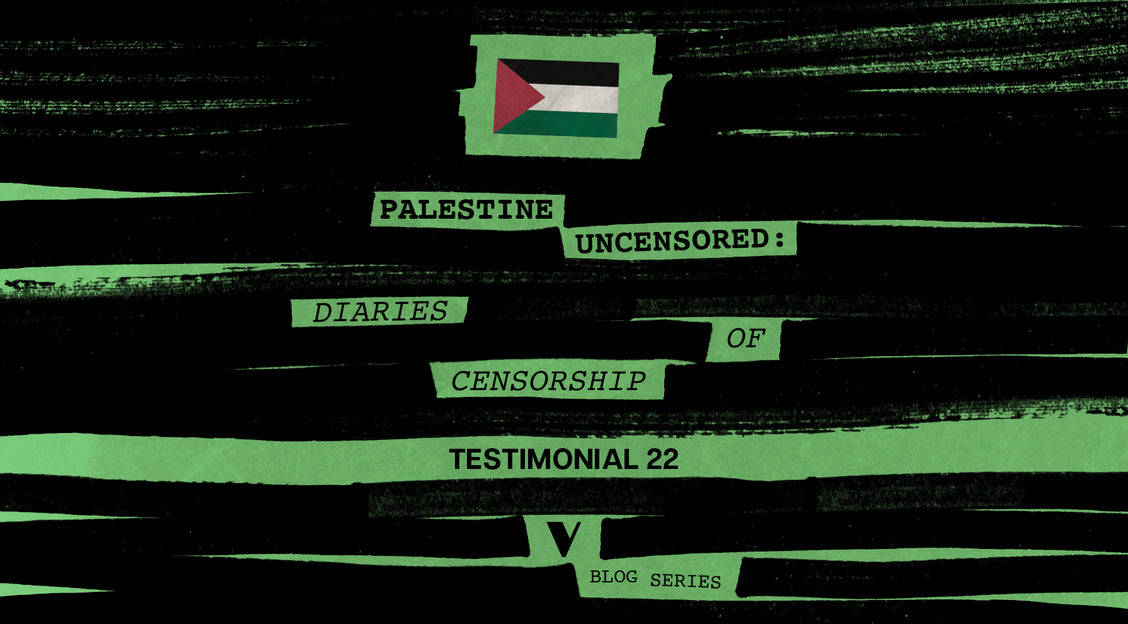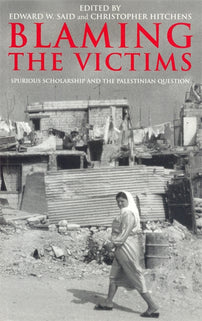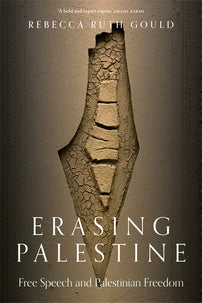Becoming Monsters: What happens when the witness becomes the defendant?
To whom should Palestinians fighting for liberation speak? For our Palestine Uncensored series, Islam Al-Khatib writes that the focus on appealing to an international audience has moderated and censored how Palestinians can imagine their fight for freedom. Instead, she argues that Palestinians must break out of the Western discursive frameworks that police their thinking about how liberation can be achieved.

In Ignorance of the Palestinian Cause: Arab Academics' Perspectives, Anis Sayegh detailed his struggles with epistemic violence while managing the Palestine Research Center, a Beirut-based Palestine Liberation Organization (PLO)-affiliated institution that was looted by Israel in September 1982. He recounted dedicating a significant amount of time to countering critics who questioned the PLO's focus on producing Arabic materials on the Palestinian cause. These critics believed that Arabs were already sufficiently informed and that efforts should instead be directed towards publishing in foreign languages to educate a more international audience. Sayegh's principal strategy was to develop Arabic content that provided a comprehensive understanding of Israel as an entity, a regime and ideology to Arab readers who, in his opinion, lacked such knowledge. The Center conducted a survey among Arab youth to identify key gaps in their understanding of the Palestinian cause with the aim of enhancing their political comprehension through targeted educational efforts. The survey covered what the Center considered to be the basic questions: Who are the groups fighting for Palestine today? Why do they fight?
Asking such questions within a similar research institution in the current moment seems to result in the institution’s immediate implosion, whether due to funding constraints, defamation, the invocation of counter-terrorism laws, or other methods of suppressing, discrediting, and delegitimizing the Palestinian cause. Understood as a bare minimum in the early 1980s, these questions of language, of the purpose of political legibility, of the audience to whom nationhood need be performed are thus left largely uninterrogated and today. This is not to stress the importance of research institutes in general, but rather to paint a micro-picture of a broader narrative that is being assembled in this moment. By the time I finished writing the first draft of this testimonial, I had already seen dozens of 'hot takes’, dubbed as ‘analysis’, from super-star academics, left, right and center. I've read them in the hopes of finding not just an answer, but any effort to sit with a history of Palestinian resistance before abstracting it; I look for any indication that the thought of Said and Fanon (and whatever the Western intelligentsia labels post-colonial) would be invoked as an extension to, rather than a substitution for, the real and evolving Palestinian struggle for liberation from epistemic violence.
Sayegh's writings come to mind in this moment not as a question of political alignments, but in terms of strategy. In the 1960s, the Palestine Research Center made a strategic choice to focus on the Arab masses, primarily because the foreigners who mattered most were already there, fighting with Palestinians. It didn't matter what ‘neutral’ actors thought or did. Unlike today, the focus on translation was much less about convincing and more about bridging and co-building. Materials were available in a variety of foreign languages. The capacity to build bridges and extend solidarity went beyond slogans and marches, reaching into the very fabric of how different movements understood the world, with Palestine ontologically centred – not as conditioned by colonisers, but by their interconnected, interdependent, liberation struggles.
Understanding the current moment as being/becoming in a collective national narrative is always a difficult task, not because of any lack of will, but due to the ceaseless parasitic extraction, dilution, and censorship to which the Palestinian narrative is subjected. We are currently experiencing an unprecedented phenomenon where the intentional rewriting of narrative unfolds through our screens, while those same devices allow us to contest this censorship. We are being told that we must work on our semantics in order to have the right to self-defense against an occupier. We are informed that in order to be considered just, our narrative must be conditioned and scaled to a shape determined by Western criteria. National narratives in-the-making often require a collective intervention to be transformed into a new moment of unity. For the longest time, we were told that the 1948 Nakba was the only connecting point between all of the now-fragmented Palestinians. Yet, we have contested this multiple times, during the Palestinian revolution, the first and second Intifadas, in Seif al Quds in 2021, and in September 2021, when six Palestinian prisoners broke out of Gilboa prison, ridiculing Shin Bet, and in so many other cases that I have not listed because I, myself, have fallen into this same trap of vagueness and abstraction.
[book-strip index="1"]
But, of course, all of this has been consistently blocked out by the noise of those who remain stuck on questions like: “who is the real Palestinian?”; “Is a two-state solution possible?”; “Maybe binationalism? A secular resistance?”; “Isn’t occupation a bad term?” They refused to listen. Now, while Gaza is undergoing genocide, their voices continue to haunt us: it is bad, but not bad enough to say you can fight against it. Once again, the same voices rise, pointing their finger at Palestinians, defining them as both victim and perpetrator. The problem here is that our people, no matter where they are, are continuously defined by their death. The imposed battle over language has gone beyond propaganda. It has essentially become a battle over what type of Palestinian agency is allowed – is palatable. The question for contemporary discourse as disseminated by academics, media, international organisations, etc. is no longer who is fighting for Palestine and why, but who will submit to the US-EU-UK’s colonial regime? Those who don’t, will be demonised. Now, more than ever, Palestinian agency is being viewed as a threat, because those who refuse to capitulate could very well revolutionise the world once again.
What this means is that a cord between ‘us’ and ‘them’ has been cut. It might not be clear at the moment, but all this censorship means that the conversation is happening elsewhere: in moments of recognition between people who know, people who want to know and people who knew and forgot what it means to commit to a struggle, to sacrifice for it, and to be transformed and carried by it.
In Prisoner of Love, Jean Genet writes “if the reality of time spent among, not with, the Palestinians resided anywhere, it would survive between all the words that claim to give an account of it”. This is what is happening today: abstracting the Palestinian cause. This abstraction isn't always malevolent; sometimes it's because concretizing means incriminating oneself. How can people fight and resist the censors if the words used to describe the fight are suddenly incriminating? In reality, this abstraction is what will cause ‘their world’ (i.e. those refusing to acknowledge Palestine as it is, and as it must be) to not to have its own collective narrative of what’s happening. What this means is that a cord between ‘us’ and ‘them’ has been cut. It might not be clear at the moment, but all this censorship means that the conversation is happening elsewhere: in moments of recognition between people who know, people who want to know and people who knew and forgot what it means to commit to a struggle, to sacrifice for it, and to be transformed and carried by it. This means, that we have been placed in the position of ‘silenced’ witnesses of a genocide, detached from our cause and our land, forced to become defendants. What happens when the witness becomes the defendant?
In 1982, amidst the Israeli forces' use of mass incarceration to suppress political and militant resistance, a significant manual emerged, entitled Philosophy of Confrontation Behind Bars. Created by prisoners and disseminated by the PFLP, this manual became a critical resource for Palestinian youth. It was designed to equip them with strategies to resist Israeli torture and humiliation tactics. The manual detailed the psychological warfare deployed by their captors, tactics aimed at eroding the prisoners' conviction in their cause and pushing them to betray their comrades for leniency. Central to its message was the emphasis on maintaining faith, perseverance, and belief in the collective struggle. It urged readers to do what was considered the hardest in such moments: to believe in others, whether militant or not, and to dismiss the belief that the people would concede to their defeat. It was a call to refuse to cooperate with an interrogator who promises you a 'chance at life' in exchange for your compromise. To refuse, at the expense of yourself, to be loyal to your people and your cause. This can never be contained within a Western framework because of what their own violence upon others has done to them. And so, Palestinians become irrational, uncivilized, terrorist human animals. And maybe, if we were to learn anything from this manual, then it would be this act of refusal. Perhaps rather than continuously altering our story, we should strive to be more concrete, even at the risk of being seen as monstrous. After all, who will recall us as such? Perhaps only those who survive this genocide and understand that our actions were nothing more than quarreling over semantics with those indifferent to our deaths.
Maybe becoming monsters is what we need to fight against a ready-made formula of analysis, which is often complex, rather than confronting a much simpler reality: Who are the groups fighting for Palestine today? Why do they fight?
If you have a story to share, please send it to pdiaries@verso.co.uk. We are publishing testimonies from all over the world. To see the full collection of testimonials, check out the Palestine Uncensored series' main page.
← Read Testimonial 21 in our Palestine Uncensored series
[book-strip index="2"]

